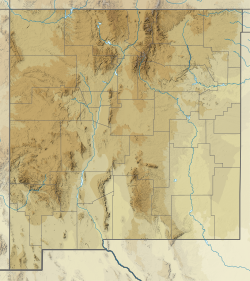| Bluewater Creek Formation | |
|---|---|
| Stratigraphic range: Carnian–Norian PreꞒ Ꞓ O S D C P T J K Pg N | |
| Type | Formation |
| Unit of | Chinle Group |
| Underlies | Petrified Forest Formation |
| Overlies | Shinarump Conglomerate |
| Thickness | 100 meters (330 ft) |
| Lithology | |
| Primary | Sandstone, mudstone |
| Other | Siltstone |
| Location | |
| Coordinates | 35°18′59″N 108°03′33″W / 35.316381°N 108.059074°W / 35.316381; -108.059074 |
| Region | New Mexico |
| Country | |
| Type section | |
| Named for | Bluewater Creek |
| Named by | Lucas and Hayden |
| Year defined | 1989 |
  | |
The Bluewater Creek Formation is a geologic formation in west-central New Mexico. It preserves fossils dating back to the late Triassic period.
Description
The formation consists of red sandstones and mudstones and has a total thickness in excess of 100 meters (330 ft). It conformably overlies the Shinarump Conglomerate and conformably underlies the Petrified Forest Formation.
The formation has been correlated with the Salitral Formation of north-central New Mexico on the basis of its lithology, but it is likely somewhat younger, with an age around 219 million years.
Fossils
The formation contains some fossil vertebrates and an extensive fossil flora. Fossil tetrapods from the Bluewater Creek Formation include the theropod dinosaur Camposaurus, phytosaur Rutiodon, the aetosaurs Desmatosuchus and Stagonolepis, and the metoposaurid Anaschisma. These are characteristic of the late Carnian.
History of investigation
Spencer G. Lucas and S.N. Hayden defined the Bluewater Creek Member of the Chinle Formation in 1989, assigning to it beds formerly assigned either to Division D, lower red member, or Monitor Butte Member of the Chinle Formation. With their subsequent promotion of the Chinle in northwestern New Mexico to group rank, the Bluewater Creek was promoted to the Bluewater Creek Formation.
On the basis of high-precision detrital zircon geochronology, Ramezani, Fastovsky, and Bowring concluded in 2014 that the Bluewater Creek beds are correlative with the uppermost Blue Mesa Member to middle Sonsela Member of the Chinle Formation of the Petrified Forest National Park in Arizona, and recommended that the formation be abandoned.
See also
References
- ^ Lucas, S.G.; Hayden, S.N. (1989). "Triassic stratigraphy of west-central New Mexico" (PDF). New Mexico Geological Society Field Conference Guidebook. 40: 191–211. Retrieved 3 August 2020.
- Zeigler, Kate E.; Geissman, John W. (June 2011). "Magnetostratigraphy of the Upper Triassic Chinle Group of New Mexico: Implications for regional and global correlations among Upper Triassic sequences". Geosphere. 7 (3): 802–829. doi:10.1130/GES00628.1.
- ^ Lucas, S.G.; Heckert, Andrew B. (May 1997). "Triassic stratigraphy and paleontology on the Fort Wingate quadrangle, west-central New Mexico". New Mexico Geology. 19 (2). Retrieved 3 August 2020.
- Ramezani, J.; Fastovsky, D. E.; Bowring, S. A. (1 June 2014). "Revised chronostratigraphy of the Lower Chinle Formation strata in Arizona and New Mexico (USA): High-precision U-Pb geochronological constraints on the Late Triassic evolution of dinosaurs". American Journal of Science. 314 (6): 981–1008. doi:10.2475/06.2014.01.